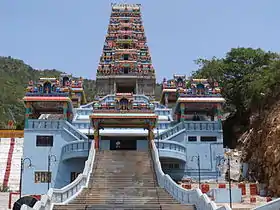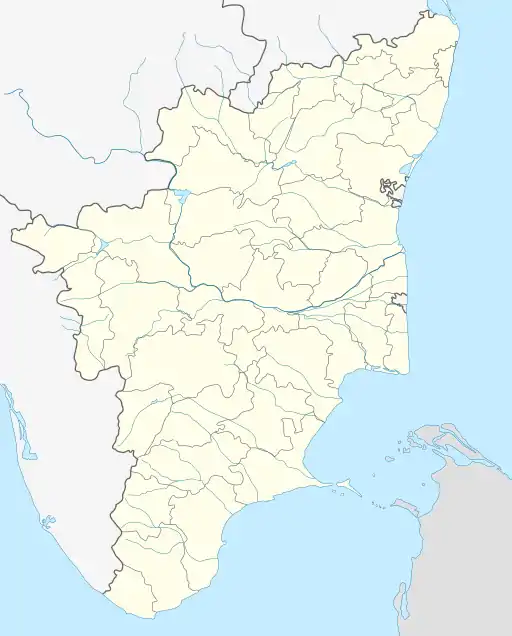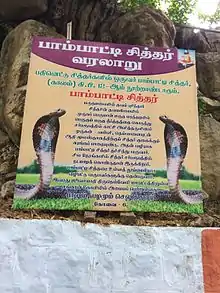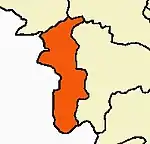Marudhamalai (temple)
Marudhachalamurthy (Lord Muruga) Temple, Marudamalai is a popular 12th-century hill temple situated in Coimbatore, Tamil Nadu, India. Built by Tamil kings during the Sangam period as indicated in the Purananuru, the temple is dedicated to Lord Murugan and is considered the Seventh House of Lord Murugan.[1] Like most Murugan temples, the temple is situated upon a hillock, part of the Western Ghats about 12 km west from the centre of the city of Coimbatore. Thai Poosam and other Murugan festivals are celebrated.[2] The name 'marudham' is derived from the native trees marudha maram (Terminalia arjuna) present in the hill where the temple is situated and 'malai' in Tamil language is meant hill or mountain. This Murugan temple is special since it is in east face on the hill compare to other Murugan temples on the hills.
| Arulmigu Thirumurugan Thirukovil, Marudhamalai | |
|---|---|
 | |
| Religion | |
| Affiliation | Hinduism |
| Deity | Murugan |
| Location | |
| Location | Coimbatore |
| State | Tamil Nadu |
| Country | India |
 Location in Tamil Nadu | |
| Geographic coordinates | 11°2′46″N 76°51′7″E |
| Architecture | |
| Type | Thamizh |
| Completed | 12th century |
| Website | |
| www.marudhamalaimurugantemple.tnhrce.in | |
On many evenings, the devotees take out a procession of Lord Murugan sitting in a chariot (Rath Yatra) and take a circle around the temple.
Architecture
The temple is atop a 600 ft (180 m) tall granite hill in Coimbatore. The presiding deity is addressed by multiple names like Marudhamalai Andavar, Marudachalapathi and Dhandayuthanpani. There are various water bodies around the temple, namely Maruda Theertham and Snake charmer's spring, which is believed to possesses medicinal properties.[3]

Paambatti Siddhar
In Southern end of the temple pragaram staircase to the Pambatti Siddhar cave is located. Pambatti Siddhar was one of the 18 siddhars. He lived during the 12th century. Pambatti Siddhar performed penance in the Marudhamalai hill. Lord Murugan is said to have appeared as a snake to him. Later, Lord Murugan appearing along with his consorts Valli and Deivanai is said to have given Siddhar marudha theertham and blessed him. A connecting tunnel route from Lord Murugan's sanctum sanctorum and Siddhar's cave was formed and Siddhar is believed to have used it to worship the Lord.
References
- Subburaj, A (27 September 2015). "Domestic tourism flourishes in Coimbatore district". Times of India. Retrieved 9 March 2016.
- "Thai Poosam celebrated with fervour". The Hindu. 4 February 2015. Retrieved 9 March 2016.
- V., Meena. Temples in South India. Kanniyakumari: Harikumar Arts. p. 20.
| Wikimedia Commons has media related to Marudhamalai Temple. |
